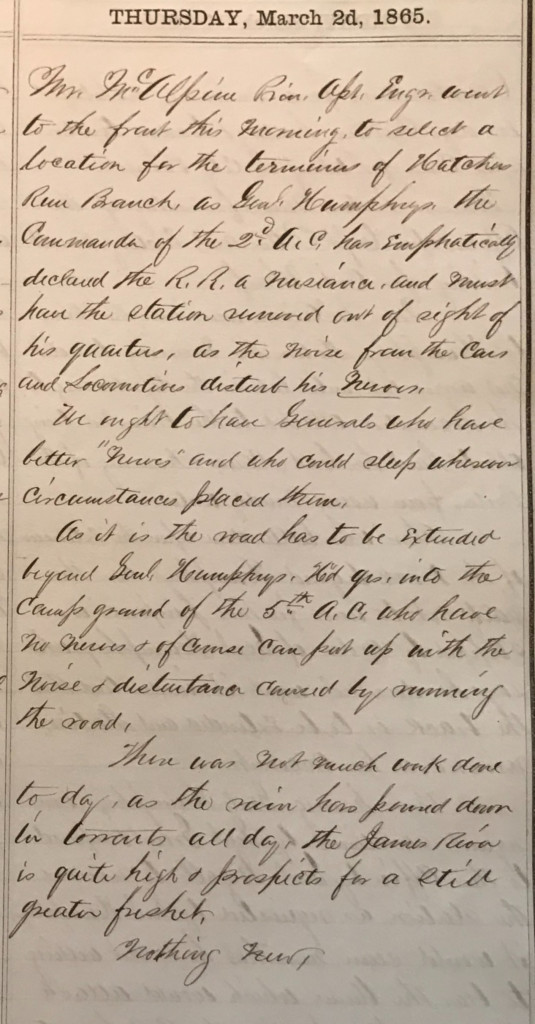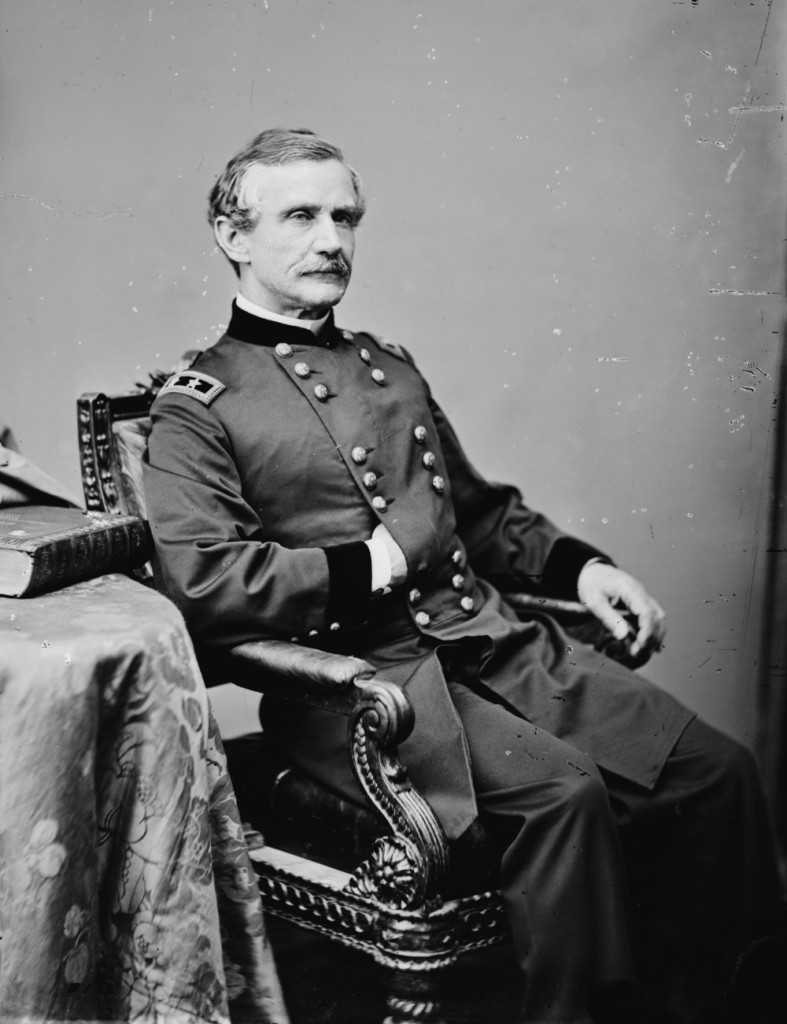One of the things that I looked at when I visited the National Archives a few years ago, was a journal that had daily entries. These entries loosely described what the engineering and construction corps of the USMRR was up to on each day of the Petersburg champaign. I’m not exactly sure who was responsible for making the entries, but there is handwriting from several different people in the journal. Typical entries reported on the weather, what the various construction gangs were up to, significant military and political events and so on. Like most diaries, the content isn’t that exciting, but there are a few gems in there. Here is one of more interesting entries that I encountered.

Here is it transcribed.
Thursday March 2d, 1865
Mr McAlpine, Prin. Asst. Engr went to the front this morning to select a location for the terminus of the Hatcher Run Branch as Genl Humphreys, the Commander of the 2nd A.C. has emphatically declared the R.R. a nuisance and must have the station removed out of sight of his quarters, as the noise from the cars and locomotives disturb his nerves.
We ought to have Generals who have better “nerves” and who could sleep wherever circumstances placed them.
As it is the road has to be extended beyond Genl. Humphreys Headquarters into the Campground of the 5th A. C. who have no nerve & of course can put up with the noise & disturbance caused by running the road.
There was not much work done today, as the rain has poured down in torrents all day. The James River is quite high & prospects for a still greater freshet.
Nothing New
There are several remarkable things about this entry.
First of all is the comment about the need for “Generals who have better nerves.” I worked for almost 40 years in various tech jobs for companies big and small. Though it is pretty routine for an individual to complain about a managers decisions, it is extremely rare for anyone to put it down in writing. Usually, that becomes what is known in industry as a career limiting move or a “CLM.” I can only guess that the entry was written either by a civilian employee or someone else that didn’t intend on making the army a career.
The second thing that struck me is how a general might demand that the railroad move it’s terminus so all the activity didn’t disturb his nerves. This caused me to spend some time investigating general A.A. Humphreys to see just what kind of person he was.
What I found was a most interesting man. A graduate of the West Point class of 1831, A.A. Humphreys became a highly respected civil engineer. Before the Civil War, he led the survey that was to plot the route for the first transcontinental railroad. He also started work on a detailed analysis of the Mississippi River that was intended to help the engineers improve navigation. That analysis was published shortly after the war.
Though highly respected, he was apparently very set in his ways and it appears he had few close friends. That he navigated the changes in command of the Army of Potomac with little controversy, is probably a reflection of his independent nature. It appears he had a reasonably good relationship with General Meade, who asked him to be chief of staff of the Army of Potomac after Meade took command. At first Humphreys refused the offer, preferring to remain a division commander. Later on, he was asked again to take the position and accepted. Also, General Abbot, who commanded the siege Artillery at Petersburg worked with Humphreys on the Mississippi River project before and after the war. I wonder if it was Humphreys who recommended that Abbot be put in charge of the siege artillery in front of Petersburg. It is somewhat interesting that with all his knowledge of the Mississippi River, that Humphreys was never sent to assist in the fight on that front.
That an engineer of his esteem would make the USMRR move it’s station because of how it disturbed his nerves is very surprising to me and I believe very reflective of his difficult nature. However, there is the possibility that the engineer Humphreys just didn’t like the location chosen for the station for other reasons than “nerves” and had the USMRR move it to what he considered a better spot.
The American Philosophical Society, which was and is one of America’s leading intellectual societies had a lecture by Hampton L. Carson about Humphreys shortly after his death. This paper described Humphreys as follows.
The life of Andrew Atkinson Humphreys was one of reflection and action, of incident and character. A man of science, a brilliant soldier, an accomplished scholar, a polished gentleman, the lineal descendant of distinguished men, and the inheritor of their talents and virtues, he displayed in every walk of life the highest qualities, and combined the most opposite characteristics. Born to command, he easily attained the front rank in every species of labor which he undertook, yet his modesty was as great, as it was rare. His intercourse with men was graced by a charm of manner, a simplicity of diction, purity of sentiment, a gentle resistlessness of will that armed him with a power which few could oppose with success ; or if, misled by these, they had dared to stir the half-hidden fire of his nature, they would have found him as terrible as Saul. … …he was in public and in private, a man to be feared, to be trusted, to be admired, to be loved ; a man with whom no one could trifle, and whom no one would care to offend.
This picture of him, seems to portray a pretty intense person.

I think this difficult nature also explains how long it took him to attain corps command in the Civil War. However difficult he was, he seemed to know how to defer to superiors, as it seems he was never fired from a job. What do you think about A.A. Humphreys?
